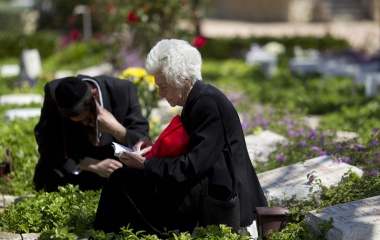
Psychologists estimate that the pain of losing money is twice as great as the joy of making money (see here). It is for this reason that Jewish law says that a wealthy person who loses his money should, in theory[1], be given charity to the manner in which he was accustomed (Ketubot 67b). It is most difficult to go from riches to rags.
Rav Yochanan ben Zackai was riding a horse and came across a young woman searching for food in the dung of animals. Rav Yochanan ben Zackai inquired as to her identity and was shocked to learn it was the daughter of Nakdimon ben Gurion. Along with Kalva Savua, Nakdimon ben Gurion was one of the richest of people in the first century. "He said to her: the money of your father's home, where did it go?...She said to him, 'the salt of money is to lessen it'" (Ketubot 66b).
While the proximate cause of the loss of the money was most likely the upheaval to life caused by the Roman conquest, destruction of the Temple and exile, Nakdimon ben Gurion's daughter sought a "religious" explanation. If one wants to preserve,"salt", one's money one must make it less by giving it away to those in need. One keeps one's money for oneself at his own peril. Riches are "a revolving wheel", and it is most rare for family wealth to remain beyond three or four generations. One must invest wisely, and there is no better investment than philanthropy.
This nameless daughter of wealth, now reduced to poverty, asked Rav Yochanan ben Zackai if he remembered "signing her ketuba". He turned to his students[2] and said, "I recall when I signed the ketuba of this one, and I read there, a thousand thousand (i.e., a million) gold coins from her father's home, not including the amount from her father-in-law". Rav Yochanan ben Zackai cried; only those with a heart of stone would not cry at the turn of events. Yet this cry was accompanied with a message as he proclaimed "How blessed are Israel; when they do the will of the Omnipresent [i.e., by giving charity], no nation nor language has any power over them; but when they do not do the will of the Omnipresent, He delivers them into the hands of a low people, and not only in the hands of a low people, but into the power of the beasts of a low people". The personal sorrow is great, but the lesson for the people of Israel is greater still.
Had the story ended here, it would be a sad but powerful one. But what follows is more powerful, even frightening.
The Gemara is perplexed. "Nakdimon ben Gurion didn't practice charity? But we learned: It was said of Nakdimon ben Gurion that when he walked from his house to the house of study, woolen clothes were spread beneath his feet and the poor followed behind him and rolled them up" (Ketubot 66b-67a). To this, the Gemara gives two answers, one more powerful than the next. Yes, Nakdimon ben Gurion gave much charity. However, he gave it for his own honour[3].
Yet is giving, even if only for ulterior motives, so bad? Our Sages teach, "One who says this charity is so that my son may live, behold, he is totally righteous" (Rosh Hashanah 4a). One could distinguish between giving to save a life and giving for honour. But perhaps one need not distinguish. Maybe one who gives for honour is also totally righteous. Maybe the way of the world is that the totally righteous, like all others, are prone to the ups and downs of wealth. And the way to avoid this common fate is by being most modest with one's wealth--by giving quietly, seeking no recognition, so that it is not noticed and "taken away."
What one's motivations are for giving charity are hard to discern--often even to oneself. Thus, the Gemara has a second approach to help us maintain our wealth. Nakdimon ben Gurion lost his wealth, our Sages suggest, because he did not give as he should. Yes, he gave a lot, but for the very wealthy, a lot is generally not enough.
Can it be enough for a billionaire to give 100 or even 500 million dollars to charity? How much does one need to live the high life for one's self, children, grandchildren and great-grandchildren? Ten million? Fifty million? Okay, let's say 100 million dollars. What about the rest?
I have often written (see for example here) about the wonderful Giving Pledge (I strongly encourage you to read some of the inspiring words of these philanthropists) initiated by Warren Buffet and Bill Gates for the billionaires of the world to dedicate a majority of their wealth to philanthropy (Buffet is donating 99%).
We await a parallel campaign where the wealthiest Jews (and I might note that one does not need a billion dollars to be very, very wealthy) around the world will do the same with at least 50% of their philanthropy going to Jewish causes. There is no better insurance--one that will benefit both recipient and donor.
[1] I say in theory because with so many pressing needs, restoring a person to their previous position is a goal we are unlikely to ever be able to satisfy. It is the concept of empathy for the loss of wealth of our fellow that our rabbis wished for us to feel.
[2] This seems to me a most sensitive "turn". To directly "remind" her of the value of her ketuba would be even more painful. He thus turned away, telling his students and deriving a moral message.
[3] While the Shulchan Aruch (Yoreh Deah 249:13) quotes varying views as to whether it is appropriate to receive recognition for one's philanthropy, even the lenient position is likely due to the fact that such inspires others to give, not that one gives for one's own glory. True, the "others" may be giving for glory, but giving for glory is much better than not giving at all. And that brings us to our second answer, above.



